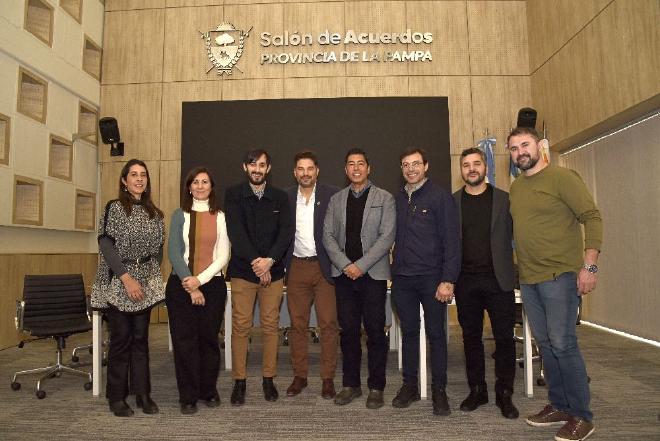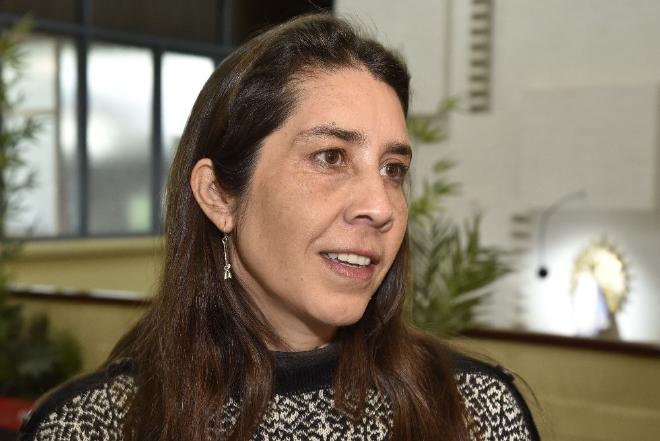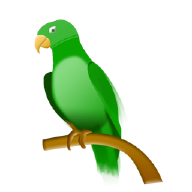

While an intense day of work was underway at the Seminar on Aspects of Illicit Trafficking in Cultural Heritage Property, Pablo Lucero, the Secretary of Culture of La Pampa, led a meeting with his colleagues from the other provinces that make up the Patagonian Cultural Entity to announce the host of the next edition. Neuquén was the chosen province, which will address the topic next year with a focus on private institutions.
In the Meeting Room of the La Pampa Government House with Lucero were Marcela Cardillo, head of the Promotion and Development of Cultural Industries and Tourism of the Federal Investment Council; Alcira Sandoval Ruiz, specialist in the Culture Area of the UNESCO Montevideo Regional Office; Claudia Cabouli, director of the National Directorate of Cultural Properties and Sites of the National Secretariat of Culture; Oscar Sarhan, undersecretary of Culture of the province of Neuquén; the Secretary of Culture of the Province of Río Negro, Franco Ávila; and the Secretary of Culture of the Province of Tierra del Fuego, Antarctica and the South Atlantic Islands, Aureliano Rodríguez Gómez.
“We are very proud of the teamwork being done, and this seminar is an example of the coordination and synergy achieved,” Lucero said, who especially expressed his gratitude for the support of UNESCO and the IFC. “The goal is to continue along the same lines, and it is satisfying to know that we have already decided on the next venue and theme,” he added.
In turn, the Undersecretary of Culture of Neuquén, Oscar Sarhan, expressed his gratitude to La Pampa as the host province and expressed his happiness at hosting the next edition. “We have been working as a team for many years, and it will be a pleasure for Neuquén to welcome you. In Patagonia, we are very concerned about this theme, and the holding of these seminars is a clear example of that common interest.”
A complex phenomenon #
In addition to the most widely reported crimes such as theft, looting, or smuggling of cultural heritage assets, there are also the financing of terrorism, money laundering, and international organized crime.
These new attacks require the coordinated, ongoing, and sustained work of the various stakeholders involved. To achieve this, it is essential to first identify the agents involved in the protection of cultural assets, then address specific training, knowledge, and dissemination of available tools.
La Pampa’s work to prevent “cultural plundering” is highlighted #
UNESCO expert Alcira Sandoval Ruiz, who is participating in the Seminar on Illicit Trafficking of Cultural Heritage held in La Pampa, emphasized the importance of raising awareness on the issue. “Cultural plundering cannot be shown in YouTube or TikTok videos without any consequences,” she warned.

Speaking to the Provincial News Agency, Sandoval Ruiz expressed her satisfaction with the work done by La Pampa as host of the event. “We are very pleased with the organization of the Seminar by La Pampa. They received us excellently and have been very professional. Our expectation is that the provinces of the Patagonian Cultural Entity can strengthen their capacities to prevent illicit trafficking of cultural heritage assets,” stated the UNESCO expert.
“This time, the target audience is made up of officials from the Judiciary. The first was dedicated to the various security forces, and next year’s will focus on private institutions,”. she explained.
The key, according to the official, is “providing the prosecutors who must act in these cases with the tools and knowledge to find a solution to the problem.”
“We know there are few people specialized in heritage in the justice system; this is a widespread phenomenon, which is why it is important to transmit knowledge and build networks of contacts,” she explained.
She also referred to the issue of fossil trafficking, which is perhaps the greatest threat in this area facing Patagonia. “It is a very hot topic, which is why La Pampa and the rest of the provinces requested this type of activity, which we support from UNESCO and the CFI.” While there is awareness regarding the value of cultural assets, Sandoval Ruiz believes there is still much to be done. “It’s true that people are more informed now, but awareness campaigns must be carried out constantly. On social media, you often see YouTubers or TikTokers uploading videos of their cultural plundering as if it were a show.”
At this point, she made an important clarification: “Many people don’t do it out of malice, but because they don’t know. That’s why campaigns to raise collective awareness are important. When you see a fossil in the ground, you should know that it’s national heritage, and what nature leaves in a place should be left there. But there are also illicit organizations that seize these assets and traffic them.”
Regarding UNESCO’s work in Argentina, she noted that “this is a very dynamic back-and-forth, in which we receive suggestions or proposals from officials across the country and design an action plan tailored to the needs of each region. In Chaco and Santiago del Estero, for example, seminars focused on the topic of meteorites were held. In other words, a specific action is implemented based on the problems in each area.”
“The intention is for this to be a training for trainers, so that those who come here don’t just retain their knowledge but instead universalize it and expand the network,” she concluded.

